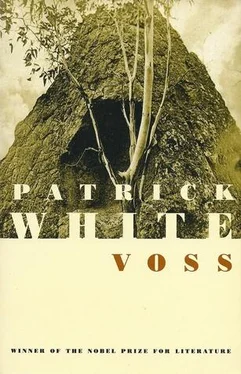As the lad stared at his leader, the sun’s rays striking the surrounding rocks gave the impression that the German was at the point of splintering into light. There he sat, errant, immaculate, but ephemeral, if he had not been supernal.
‘We will never get that far,’ muttered the gloomy Harry Robarts.
‘He would not want you to,’ said Judd.
But the boy would have jumped from his horse, and torn his knees open on the rock. As it was, aware of some disloyalty to his leader, he spat out the remains of the bitter, and now offensive gum.
‘I will stick closer than anyone, in the end,’ said Harry. ‘I will sit under the platform. I will learn languages.’
‘That is mad talk,’ protested Judd.
Both were uneasy over what had been said, because either it could have been the truth, or only half of it, and which was worse it was difficult to tell.
‘Mad,’ repeated Judd, hitting his horse with the hard, dirty flat of his hand. ‘First birds, and now languages. What languages will you learn, Harry? German?’ He had to laugh.
‘It does not matter; German or any other. I will learn to speak what Mr Voss will understand, and tell what I have inside of me.’
‘What purpose will it serve?’ asked Judd, looking at the closed rock.
He had grown gloomy.
‘Some people can write it down,’ continued the boy. ‘But I cannot write no more than speak. Not like Mr Le Mesurier. He has written it. I seen the book.’
‘Oh?’ said Judd. ‘What has he written?’
‘How do I know?’ cried the exasperated Harry. ‘If I cannot read but big print.’
So that man and boy were plunging heavily on identical horses amongst the rocks.
‘He is keeping a journal,’ the man decided, finally. ‘Like Mr Voss.’
‘It is not that,’ said the boy. ‘He has a different look. I have watched him writing it.’
‘Then we will see, I expect, some day,’ sighed the man.
‘Not us,’ sneered the boy. ‘These here deserts will see it, the pages blowing about, till the sun has burnt ’em. We will not be here.’
‘I will not die. Though I may not know enough to read,’ said the man through his blunt teeth.
‘We will all die.’
‘You are mad, Harry!’ cried Judd.
‘I know as I am somewhat simple,’ confessed the boy, ‘and cannot put things good.’
He had even forgotten Voss, who, when he looked again, was gone over the other side, and in his place were the swords of the sun, slashing at the quartz, and with less spectacular effect at a long, soft cloud of celestial wool, such as the men would not have imagined after looking so long at the dirty stuff on their own sheeps’ wretched backs. However, the cloud itself grew dirtier with the afternoon, and was increasing, and changing uglily.
Towards evening, men, horses, mules, and cattle had crossed the ridge, and were gathered at a point where a gully, descending upon a plain, joined the dry bed of a river.
‘Sure enough it will rain,’ said the men, whose eyes were already shining with moisture, and lips filling, while horses whinnied painfully, and blunt noses of cattle were snuffing.
In hopes that the river would be restored, it was thought to camp there where they were, and to beat a retreat if necessary to higher ground.
‘There are still the sheep, though,’ remembered Palfreyman.
Then, with his arm, Voss flung away the sheep.
‘We must abandon these,’ he frowned. ‘They do not keep up. They are costly in time.’
Because rain must fall at the expense of time, he frowned even at the clouds which would soon revive his own skin.
‘Given feed and water, the sheep will travel faster,’ Judd submitted.
‘No,’ said Voss. ‘No. There are too few. It is not worth it.’
A flash of green lightning cut the brown air.
‘All sheep must be sacrificed,’ shouted the German against the thunder, and inhaled until it began to appear he might burst. Then he added, more practically: ‘There is nothing to prevent Ralph and Turner from killing a couple for our own use. We will dry the mutton and carry it on.’
The hills were jumbling and rocking.
‘Somebody must inform Ralph,’ the German continued to shout, of necessity, at those others who were unbuckling girths, unknotting knots, hobbling horses, or stretching pathetic squares of canvas, to cover their unwillingness to return across the ridge.
‘Let me see,’ reflected the Voss who was as exultant as the storm.
He was never so hateful as when identifying weakness, and now, in this brown storm, almost anybody could have been accused.
Then, strangely, he altered his approach.
‘You, Frank, will better go,’ he ordered Le Mesurier, but making it a conspiracy between themselves.
For he had already sensed, early in their association, that the young man was possessed of a gristly will, or daemon, not unlike his own. Now, smiling his approval, the German’s lips were tinged with the green of lightning.
Le Mesurier, however, did not return the smile, but got upon his horse, which had remained saddled, in readiness, it seemed, and went.
From the beginning, the rider had to urge his horse. As the almost dislocated withers in front of him proceeded to toil back up the ridge, the mare’s ears remained sad, her body had become a slab, or muleflesh, for horses do associate themselves with the more rational behaviour of men, mules with none. Through the irrational, brown dusk, premature by two hours, man and horse were moving. Clouds were now so close their weave was visible, bundles of ever dirtier stuff, that were swirling and fraying, even tearing in places on the rock summit. Rocks of thunder were rolling together, so that at times the man did duck his head to avoid collision with the approaching storm, and in doing so, the brim of his hat became more ridiculously ineffectual, beating on his eyelids, and causing him pain.
Then he dragged the hat off, and stuffed it into his saddle-bag.
At once his matted hair began to stream out, and as the wind encircled the pale, upper half of his forehead, he seemed to be relieved of some of the responsibility of human personality. The wind was filling his mouth and running down through the acceptant funnel of his throat, till he was completely possessed by it; his heart was thunder, and the jagged nerves of lightning were radiating from his own body.
But it was not until the farther side of the ridge, going down, and he was singing the storm up out of him, that the rain came, first with a few whips, then with the release of cold, grey light and solid water, and he was immersed in the mystery of it, he was dissolved, he was running into crannies, and sucked into the mouths of the earth, and disputed, and distributed, but again and again, for some purpose, was made one by the strength of a will not his own.
Angus and Turner, who had crawled under a rock ledge, which provided almost a small, uncomfortable cave at the foot of the hills, looked out as darkness fell, and saw Frank Le Mesurier descending the slope. They called, and he headed towards them, the mare carefully picking her way.
The faces of the troglodytes were shiny like their own rock, as their skins had become soaked before reaching shelter. To the messenger who had just descended through the cloud, they also looked repulsively human. Sheep were huddling in the deluge, in which some of them had lain down with the obvious intention never to rise. Against rocks and scrub, lean goats were flattening their sides. The goats were most shocked by the uncompromising rain.
Le Mesurier delivered his message without dismounting.
‘Well, you had better hobble your nag, Frank, and come inside. It is good in here, and you will be one more to carry a supply of mutton in the morning.’
Читать дальше












